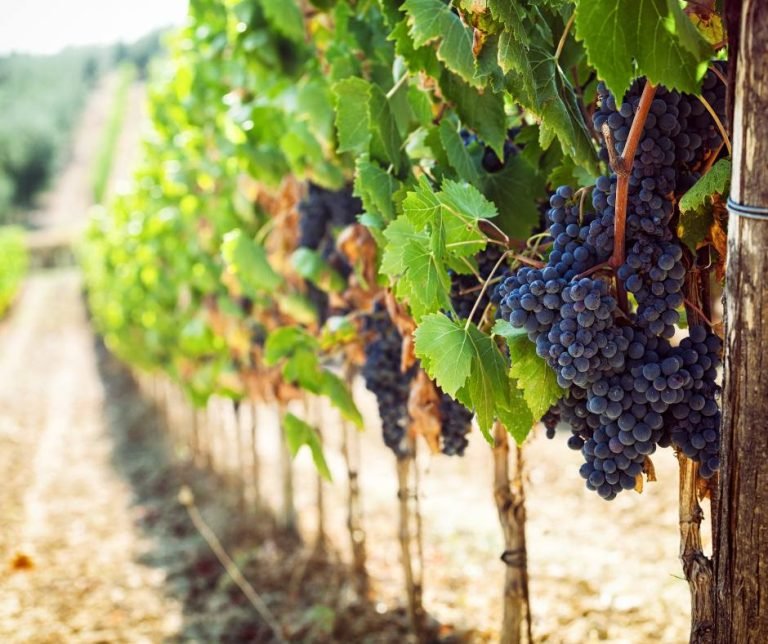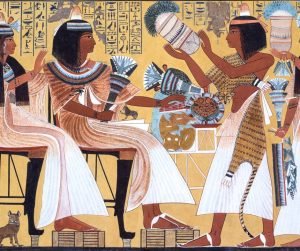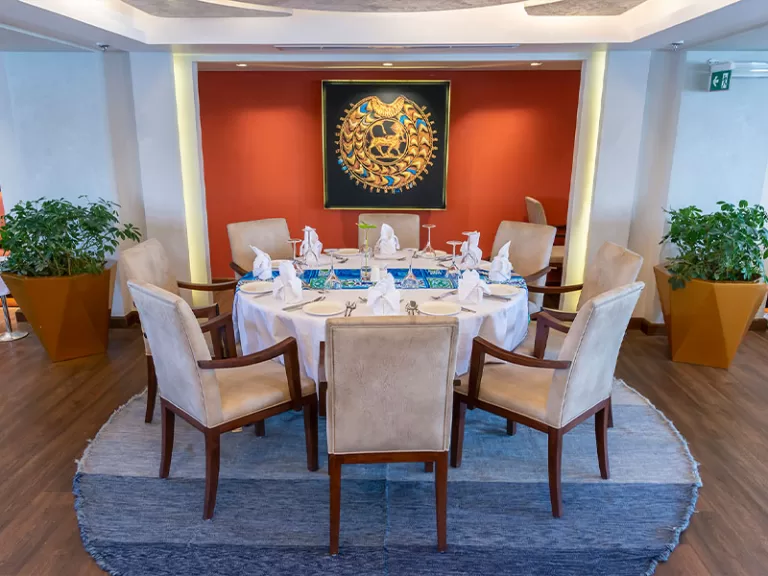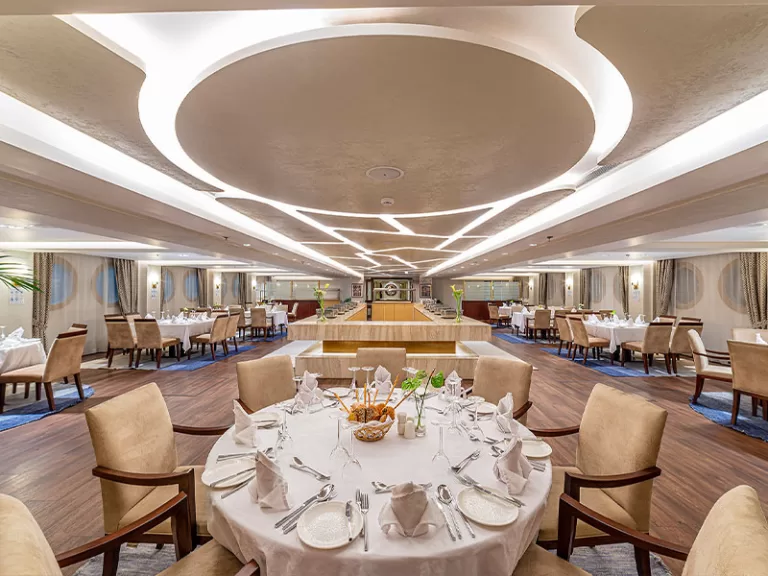

Home » Weekly Blog » Discovering Wine in Egypt: What’s Made, What’s Available, and What’s Recommended
When you think of Egypt, images of the majestic pyramids, the eternal flow of the Nile, and the wisdom of ancient Pharaohs come to mind. It’s a land known for its monumental history, its treasures of antiquity, and its mystical allure. But beneath the surface of these towering achievements lies something equally intriguing yet lesser known—a rich winemaking tradition that stretches back thousands of years. Yes, Egypt has been producing wine since the time of the Pharaohs, when wine was not just a drink but a symbol of power, prosperity, and even immortality.
Today, Egyptian wine is experiencing a quiet revival, one that blends the ancient with the modern, the traditional with the innovative. While Egypt may not yet rival the great wine-producing regions of the world like Bordeaux or Tuscany, it offers something truly unique—a taste of history combined with an emerging sense of craftsmanship and experimentation. Whether you’re an intrepid traveler seeking new experiences or a wine enthusiast curious about untapped regions, Egypt’s wine scene has something to offer you.
In this post, we’ll journey through Egypt’s wine history, explore what is made in the country today, uncover what you can purchase during your visit, and highlight the wines you absolutely must try. So, pour yourself a glass and prepare to be enchanted by the flavors of Egypt, one sip at a time.

It might surprise you to know that Egypt’s winemaking heritage predates some of the world’s most famous wine regions. In fact, the history of wine in Egypt goes back over 5,000 years, long before the vineyards of France, Italy, or Spain flourished. Wine wasn’t just a luxury item in ancient Egypt—it was an integral part of religious rituals, royal ceremonies, and daily life for the elite.
In ancient Egypt, wine was often associated with the gods, particularly Osiris, the god of the afterlife. Wine was believed to hold magical powers and was used during religious ceremonies as offerings to the gods. Archaeological discoveries in tombs have revealed wine jars that were buried with Pharaohs to accompany them into the afterlife, ensuring they could enjoy the divine nectar even after death. The murals and hieroglyphs on these tombs often depict wine production, from the harvesting of grapes to the intricate process of fermentation and storage.
The ancient Egyptians cultivated grapes primarily in the fertile lands of the Nile Delta, where the rich soil and ample water supply created ideal conditions for vineyards. Interestingly, Egypt’s ancient wines were primarily red, though white wines did exist and were often imported from surrounding regions. These wines were known for their bold, fruity flavors, and while we may never fully know their exact taste profiles, historical records suggest that they were held in high esteem, both locally and abroad.
As time marched on, Egypt’s role as a wine-producing nation began to wane. The rise of Islam in the 7th century, with its prohibition of alcohol consumption, significantly impacted Egypt’s wine industry. While non-Muslim communities were allowed to continue making and consuming wine, production decreased dramatically, and Egypt’s once-vibrant wine culture began to fade into history.
For centuries, wine in Egypt was relegated to a minor role, with most of the country’s alcohol production shifting toward beer or other beverages. It wasn’t until the 19th and 20th centuries, with the rise of European influence and tourism, that winemaking in Egypt started to regain some momentum. By then, Egypt had become a melting pot of cultures, and with that came a renewed interest in reviving its ancient winemaking traditions.
Fast forward to the present day, and Egypt’s winemaking industry is slowly but surely gaining ground. Modern Egyptian wineries are embracing the unique climate and geography of the country while experimenting with international grape varieties and winemaking techniques. Although still small in scale compared to more established regions, Egypt’s wine industry is evolving, and the quality of its wines is steadily improving.
Egypt’s hot, arid climate poses significant challenges for winemakers. The intense heat, especially in the summer months, can make it difficult to grow certain grape varieties. However, Egypt’s winemakers have adapted by focusing on heat-resistant grape varieties and implementing modern irrigation techniques. The result is a range of wines that are well-suited to the country’s unique terroir.
Most of Egypt’s vineyards are located along the fertile banks of the Nile River, where the soil is rich in nutrients and water is abundant. Other vineyards can be found in the Mediterranean coastal regions, as well as in some desert areas where modern irrigation has made grape cultivation possible. The result is a diverse range of wines that reflect the country’s varied geography.
White Wines: Egypt’s white wines have gained the most acclaim in recent years. Grapes like Chardonnay, Viognier, and Sauvignon Blanc thrive in the hot Egyptian climate, producing crisp, refreshing wines that are perfect for the country’s warm weather. Egyptian whites tend to be light-bodied with notes of citrus, green apple, and tropical fruits.
Red Wines: Red wine production is still developing in Egypt, but there are some promising varieties being cultivated. Cabernet Sauvignon, Syrah, and Merlot are among the most popular red grapes grown in the country. Egyptian reds are typically fruit-forward with bold flavors, though they may lack the complexity of wines from cooler climates. That said, winemakers are experimenting with different blending techniques to create more balanced and nuanced red wines.
Rosé Wines: Egypt’s rosé wines have also garnered attention for their refreshing quality. Made from a variety of red grapes, these wines are typically light and fruity, with notes of strawberry, raspberry, and watermelon. Rosé wines are particularly popular in the hot Egyptian summers, offering a refreshing alternative to heavier reds.
Sparkling Wines: While not as common as still wines, Egypt does produce some sparkling wines. These wines are often made using the Charmat method (the same method used for Prosecco), and they tend to be light and fruity, making them ideal for celebrations or as an aperitif. Though Egypt’s sparkling wine industry is still in its infancy, it shows promise for future growth.

If you find yourself wandering the streets of Cairo, Alexandria, or even the Red Sea resorts, you may be pleasantly surprised by the availability of local wines. Egyptian wines can be found in various outlets across the country, including supermarkets, specialty wine shops, and restaurants. The range of wines available in Egypt varies from budget-friendly table wines to more premium options that reflect the country’s growing expertise in winemaking.
Egypt’s wine scene is still relatively small, with only a handful of wineries producing the majority of the country’s wine. However, within this limited market, there are a few standout producers that have earned a reputation for quality and innovation. Here are some of the most notable wineries in Egypt:
Gianaclis Wines: Established in 1882, Gianaclis is one of Egypt’s oldest and most famous wineries. The winery was originally founded by Greek settlers who brought with them a rich winemaking tradition. Today, Gianaclis produces a wide range of wines, including reds, whites, rosés, and sparkling wines. Their Omar Khayyam red wine is one of the most well-known Egyptian wines, offering bold fruit flavors and a smooth finish. Gianaclis also produces the popular Ayam Chardonnay, a crisp and refreshing white wine that pairs perfectly with seafood.
Kouroum of the Nile: Another prominent Egyptian winery, Kouroum of the Nile is known for producing high-quality wines that are often compared to European styles. Their Jardin du Nil series is particularly well-regarded, offering a range of red, white, and rosé wines. The winery’s focus on blending traditional winemaking techniques with modern innovation has earned it a loyal following among both locals and tourists.
Obelisk Wines: Obelisk is a more recent addition to Egypt’s wine scene, but it has quickly made a name for itself with its affordable and accessible wines. The winery specializes in local blends, offering both red and white varieties that are perfect for casual drinking. Their Obelisk Merlot is a popular choice for those who enjoy soft, easy-drinking reds, while their zesty white wines are great for warm-weather sipping.
Egyptian International Beverage Company (EIBCO): EIBCO is best known for producing Egypt’s sparkling wines, which are often served in the country’s top hotels and resorts. Their Aida Sparkling wine is a light and fruity option that’s perfect for toasting special occasions or simply enjoying a glass of bubbly on a warm evening.
Egyptian wines are widely available in tourist areas, particularly in cities like Cairo, Alexandria, and Luxor. Many restaurants, especially those catering to tourists, offer a selection of local wines by the glass or bottle. Additionally, large supermarkets such as Carrefour and Spinneys often carry a variety of Egyptian wines, making it easy to pick up a bottle for a dinner party or a night in.
For those looking for a more specialized selection, several wine shops throughout Egypt offer a curated range of local and international wines. Drinkies, a popular liquor store chain, is a great place to find a wide selection of Egyptian wines at reasonable prices. You can also find local wines at many of the country’s high-end hotels and resorts, particularly in tourist hotspots like Sharm El-Sheikh and Hurghada.
Now that you know what’s made in Egypt and where to find it, let’s dive into some specific recommendations. Whether you’re a seasoned wine aficionado or a curious traveler, Egypt offers a range of wines that are worth exploring. Here are five Egyptian wines that you should definitely try during your visit:
Named after the famous Persian poet and philosopher, Omar Khayyam is one of Egypt’s most iconic red wines. Produced by Gianaclis Wines, this red is a blend of Cabernet Sauvignon and Syrah, offering a full-bodied flavor profile with notes of dark fruits like plum and blackberry, along with hints of spice and oak. It’s a bold, fruit-forward wine that pairs beautifully with grilled meats, hearty stews, or a rich pasta dish. If you’re looking for a wine that embodies the warmth and boldness of Egypt’s climate, Omar Khayyam is a great choice.
If you prefer white wines, Gianaclis Wines’ Ayam Chardonnay is a must-try. This crisp, light-bodied Chardonnay has notes of green apple, citrus, and a touch of tropical fruit. It’s a refreshing wine that pairs well with seafood, salads, or light appetizers. Its bright acidity makes it the perfect companion for a hot Egyptian afternoon, and it’s versatile enough to complement a wide range of dishes.
Rosé lovers will find much to enjoy in Kouroum of the Nile’s Jardin du Nil Rosé. This wine is light, refreshing, and bursting with fruity flavors like strawberry, raspberry, and watermelon. It’s a fantastic choice for sipping on a warm evening by the pool or enjoying with a light Mediterranean meal. Pair it with grilled vegetables, hummus, or a mezze platter for a truly delightful experience. This rosé strikes the perfect balance between fruitiness and acidity, making it a go-to for those seeking a versatile and easy-drinking wine.
For those who enjoy softer reds, Obelisk Merlot is an excellent option. This wine is medium-bodied with smooth tannins and notes of red berries like cherry and raspberry. It’s a versatile wine that pairs well with a variety of dishes, from pizza and pasta to grilled chicken and lamb. If you’re looking for an everyday red wine that’s approachable and easy to drink, Obelisk Merlot is a great choice.
If you’re in the mood to celebrate, Aida Sparkling from the Egyptian International Beverage Company is a delightful option. This sparkling wine is light, fruity, and effervescent, with notes of apple, pear, and citrus. It’s perfect for toasting special occasions or simply enjoying a glass of bubbly with friends. Pair it with light appetizers, fresh fruit, or a slice of cake for a celebratory treat.

In modern Egypt, wine is finding its place once again, both among locals and tourists. While Egypt is a predominantly Muslim country, where alcohol consumption is prohibited for religious reasons, the country’s diverse population and thriving tourism industry have created space for a wine culture that is both respectful of tradition and open to new experiences.
For locals, wine consumption is often reserved for special occasions or enjoyed in the privacy of one’s home. However, for tourists, Egyptian wine is a key part of the culinary experience, particularly in the country’s high-end hotels and resorts. Whether you’re enjoying a glass of wine with dinner at a seaside restaurant in Sharm El-Sheikh or sipping sparkling wine at a luxurious Nile River cruise, wine is becoming an increasingly important aspect of Egypt’s hospitality industry.
The Egyptian wine industry is also benefiting from a growing interest in local products and a desire to revive the country’s winemaking heritage. Many winemakers are experimenting with new grape varieties, blending techniques, and aging methods in an effort to create wines that reflect the unique character of Egypt’s terroir. This experimentation has led to the production of wines that are not only enjoyable but also competitive on the international stage.
As Egypt’s wine industry continues to grow, there is a sense of pride in reviving this ancient craft and bringing it into the modern era. With each vintage, Egyptian wines are improving in quality and complexity, offering a taste of history combined with the excitement of discovery.
Egypt may not yet be on the map as a global wine powerhouse, but it is a country with a rich winemaking history and a promising future. From the ancient vineyards of the Nile Delta to the modern wineries that are redefining what Egyptian wine can be, there is much to explore and enjoy in Egypt’s evolving wine scene.
Whether you’re a seasoned oenophile or simply someone looking to try something new, Egyptian wine offers a unique and memorable experience. With its bold reds, crisp whites, refreshing rosés, and sparkling wines, Egypt has something to offer every palate. So the next time you find yourself in the land of the Pharaohs, don’t just explore the pyramids or sail the Nile—take a journey through Egypt’s vineyards and discover the flavors of a land steeped in both history and innovation.
Cheers to Egyptian wine, a drink that connects us to the past while offering a taste of the future.
If your travel plans are further out. Get on our wait list and we will let you know when future dates and pricing become available.
Sign up below to get on the wait list. You will be one of the first to be notified when reservations open up.
Required*
Sign up to hear about our upcoming adventures, monthly newsletter, exclusive offers, and more!
Required*
Not Ready to book?
Get regular updates on upcoming tour and special promotions.







Sign up for our Mailing List to get updates on our current offerings.